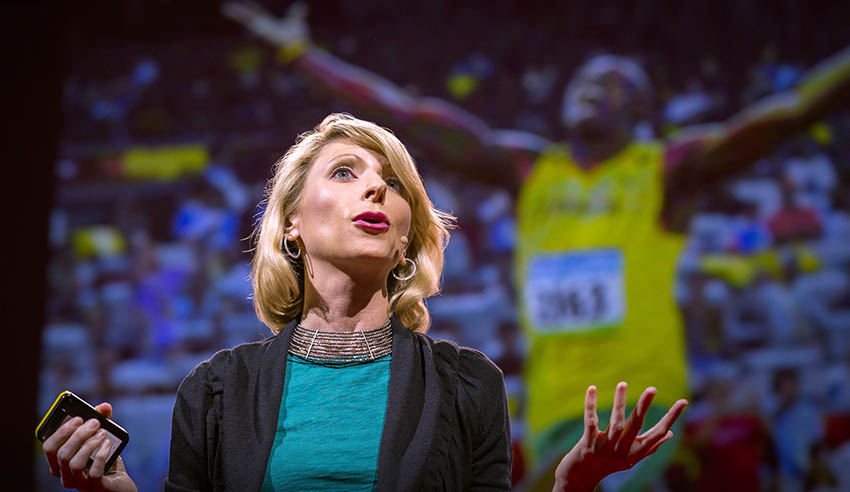Despite junior lawyers and law students being taught the importance of having a stellar “elevator pitch”, a US-based psychologist has suggested why those who use this very form of communication may find themselves struggling to secure employment.

Source: TED.com website
Appearing as a special guest speaker at Relativity’s Relativity Fest, social psychologist and acclaimed TED speaker Amy Cuddy spoke about what she described as her biggest challenge – the elevator pitch and how it impacted her ability to secure an employment opportunity.
“So a little background – in my fifth year at Princeton I was invited to go to this conference in my field. Every year they take a few grad students to shop them around because they’re on the job market. So I was chosen to do this, which I should’ve felt honoured by, but instead I felt terrified by. And I said, ‘What do I do when I get there?’ and she said ‘The safest thing is to at least have an elevator pitch. Have that ready’ and so I did script that and rehearsed it but I still went to the conference with a huge amount of anxiety.
“On the first night there’s a dinner on the top floor of the hotel and I get in the elevator to go up to the dinner. I walk in and there are three people in there. These three people, to a PhD student are like superstars. I had cited them many times but had never met them in their life, so I was really intimidated. They look at me and one of them says, ‘We’re in an elevator, give us your pitch’. Not what I was hoping for. I made no sense, words were just falling out of my mouth, my face was red, my mouth was dry, I was rushing, I kept apologising and restarting. I didn't know what I said.
“It was so bad that in that brief elevator ride I was making a Plan B. I thought I’ll never get a job; my career is over because of this moment. That’s how high the stakes were for me. We get to the top and the elevator doors open, two of them flee quickly. The one that had goaded me to give him a pitch, who clearly was enjoying this bit, he steps across the threshold and as the doors were closing, and I’m still in the elevator, he goes ‘That was the worst elevator I've ever heard’. So I stayed in the corner, huddled in a fetal position and go back down the elevator to the lobby and I wasn't able to engage in that conference.
“All I did after that was what we call post-even processing. I kept going over that situation in my mind, imagining how I could’ve done it differently, wanting a do-over. But you don’t get a do-over; you’ve just got to move on from that.”
Ms Cuddy said by far the biggest mistake people make when delivering an elevator pitch, or in any sort of high-pressure situation, is they forget to be present – something she spoke in depth about throughout the presentation.
Overall, Ms Cuddy noted there are three culprits which the human mind does that prevent us from being present.
The first is that people get “obsessed with the outcome and neglect the process”.
“I was not in that elevator thinking about what I study, I was just really worried about letting my adviser down, not getting a job, all of these outcomes,” she explained.
“The second is we’re obsessing about what others think of us, how they’re judging us and we’re usually wrong about that so that's just a waste of a time. We have to manage the impression we're making on ourselves, not the impression we're making on others.
“The last is that we feel powerless and we consent to that feeling. I want to talk about power, because power as a cognitive, emotional state is something that we ignore when we study wellbeing.
“Power matters. Feeling powerful is good and it’s ok. We fear power. When we hear people say the word power, the first people that comes to people’s mind the most often is ‘corruption’ and that’s really too bad because power itself does not make corruption. Power interacts with other variables that can lead to corruption but feeling a sense of power over oneself, not power over others or control of all the resources, feeling a sense of personal power affects us in so many positive ways. It affects our feelings, we feel more optimistic about ourselves and others when we feel powerful. We feel more confident. We have a general sense that the world is a safe place, we think differently.
“When people feel powerful they’re more creative, they think more clearly, they do better and positive tasks because they’re feeling less restricted. We behave differently. When we feel powerful, we act. We are much more likely to act with a sense of power then from a sense of powerlessness.”

Emma Musgrave (née Ryan) is the managing editor, professional services at Momentum Media.
Emma has worked for Momentum Media since 2015, including five years spent as the editor of the company's legal brand - Lawyers Weekly. Throughout her time at Momentum, she has been responsible for breaking some of the biggest stories in corporate Australia. In addition, she has produced exclusive multimedia and event content related to the company's respective brands and audiences.
Prior to joining Momentum Media, Emma worked in breakfast radio, delivering news to the Central West region of NSW, before taking on a radio journalist role at Southern Cross Austereo, based in Townsville, North Queensland.
She holds a Bachelor of Communications (Journalism) degree from Charles Sturt University.
Email Emma on: